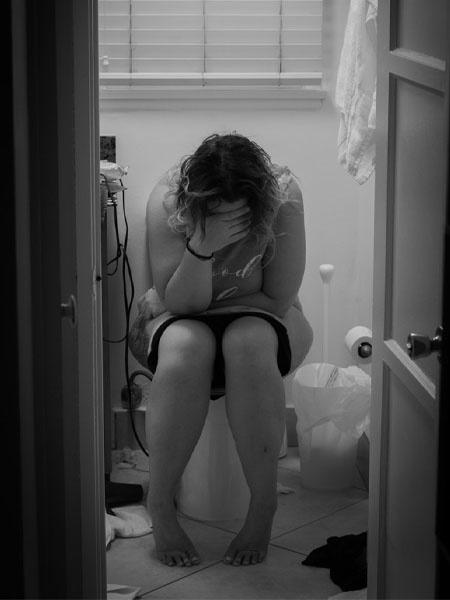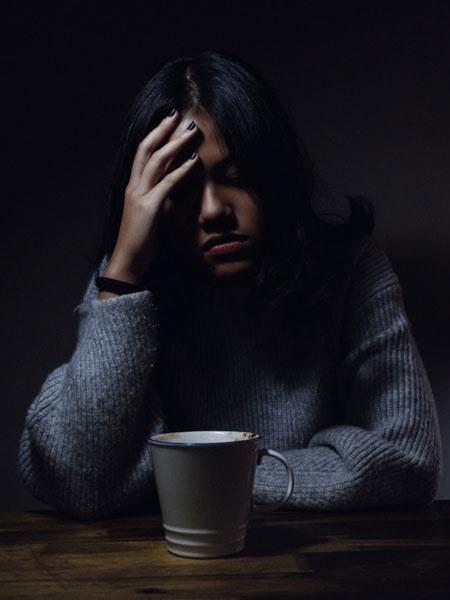Disclaimer: This is the author’s personal opinion based on personal experiences. This article does not contain the opinions of a medical practitioner or psychologist. The author is not a licensed doctor. Reader discretion is advised.
You can do a blood test to detect diabetes. You can get a urine test to detect B.Coli. Now, there is increasing research into whether mental illnesses can also have physical symptoms, or physical repercussions. As someone who has been diagnosed with clinical depression and anxiety, I have lived with the mental and physical impact of these diseases, as well as the side-effects of the medication prescribed for them, for five years. Here are the things I’ve observed in that time, which you may not know of.
First we should ask ourselves: should a mental health issue have to have physical repercussions to be taken seriously?

Image Credits: Unsplash
One of the main things we hear about mental disorders like depression is that you can’t see the symptoms physically. In my case, having physical symptoms for mental illnesses has been like a double-edged sword. Those who believe mental illnesses are “all in the head” refuse to understand that the physical problems they cause are real. Not being able to function due to physical aches and pains, other than temper and mood issues, is an additional burden that no one talks about, because mental illnesses are only supposed to be mental, right? Wrong. They are not.
However, this isn’t talked about often because physical evidence of mental illnesses, in theory, is used to discredit the gravity of purely mental illnesses. Those who want to fight the incorrect assumption that all illnesses have to be physical in order to be taken seriously are therefore wary of highlighting the physical aspect of it. There is a danger that giving physical proof builds the argument that no disorder can be entirely mental and that only having physical symptoms makes it a reality. This idea is obviously dangerous, as not everyone will necessarily have physical symptoms, so relying on them for diagnosis can delay or prevent diagnosis, and is a threat to the well-being of those suffering from a mental health issue.
In either case, the fact remains that physical repercussions from having mental health problems are very real.
Heart palpitations and nerve tremors due to anxiety are one of the things I have to take medication for

Image Credits: Pexels
One of the main reasons my mental illnesses even got diagnosed was because I used to get frequent nerve tremors. Picture this: you’re lying down and suddenly you feel like everything is shaking, like there’s an earthquake. But, you wake up and all the bottles are in place, and there is no earthquake. I spent years like this because I didn’t know what nerve tremors were or that I had anxiety.
In addition to that, my heart would also beat in strange ways, often not letting me sleep. Called palpitations, this irregular and loud thumping was another way my anxiety showed itself physically. Needless to say, both heart palpitations and nerve tremors are not pleasant, and I have no relief from them without medication. It’s clearly not something that’s “all in my head.”
Weight gain caused by being on anti-depressants is a very real thing

Image Credits: Unsplash
Many people are fat-shamed on top of having mental health issues, and it has been no different in my case. For a long time I wondered what was causing my weight gain despite no changes in diet or exercise. I took thyroid tests, exercised, and even ate less. Then, I came across several other people who take medication for mental health disorders who also experienced the same. They had all gained unforeseen amounts of weight in a year or so.
While it is hard to shout “Anti-depressants can cause weight gain” from the rooftops and educate people due to the lack of research on WHY it happens, the NCBI has published a study saying it the consumption of certain medications (including the one I take) can and does cause weight gain.
Stomach problems due to anxiety are also an issue

Image Credits: Unsplash
I am often made fun of and my diet is questioned due to my frequent stomach problems. Despite the fact that people know I have depression and anxiety, the knowledge about it being connected to my mental health problems, is not common, because there is relatively no research on the subject.
That said, what Melissa Jones, a clinical psychologist with a PhD, told Healthline, is worth considering, because she says that however psychosomatic, anxiety-related stomach problems are real and common: “Many people get an upset stomach at times when they are nervous or trying something new. People with anxiety can have that feeling all of the time, and then have those symptoms increase to diarrhea or migraine when their anxiety and stressors increase.”
Frequent stress headaches make functioning difficult

Image Credits: Unsplash
Mental health problems are often caused by chemicals in your brain going awry, and since that process isn’t exactly a party for your mind, headaches are often a freebie with mental illnesses. This is one of the more “acceptable” physical repercussions of having a mental health problem, because people are quicker to understand the connection between the brain and headaches. However, it is often seen as something that’s easy to fix because it has a mental trigger. “Having stress headaches? Don’t be stressed!” You know, because it’s that simple.
Insomnia and sluggishness make working and waking up on time impossible for me

Image Credits: Unsplash
Depression and anxiety have had a major impact on my life due to two things: my inability to sleep on time, and my inability to feel energetic and charged-up. Getting out of bed is one of the toughest things about having depression, as much as people want to pass it off as wilful laziness. Drink all the coffee you want, but your brain refuses to wake up.

Image Credits: Pexels
On the flipside, winding down at the end of the day and sleeping is also really difficult, no matter how many meditation apps you use or how much chamomile tea you drink. The result is a messed-up sleep schedule, difficulty in working, and having to cope with a world which just doesn’t function on the same level as you.
A lifestyle problem so debilitating, this cycle of exhaustion and lethargy is frustrating, because no matter what medicines you take or what you do, sometimes you just can’t work. Sometimes your brain refuses to cooperate. Sometimes your body just can’t function. Without understanding people around, such situations can make one feel really helpless, especially working professionals who have to stick to schedules and perform certain tasks. It makes one feel like this life of living and working is not sustainable, because not only does it require an insane amount of effort to function, but sometimes, despite your best efforts, you cannot get anything done. So where does one go?

Image Credits: Unsplash
That’s why spreading awareness about mental health is so important. A silent, invisible condition that people need to be understanding about, mental illness is incredibly frustrating to have, because you are at battle with your own mind at times. Even when I know that my anxiety is giving me a headache, I cannot do anything about it. My mental illnesses aren’t always in my control, and sometimes the medication is what causes the problem.
In that moment, if an understanding boss gives me the day off, or an understanding friend offers to help me with my study notes, my unburdened mind deals with the situation better. So, if my experience with the physical symptoms of mental illnesses has taught me anything, it is that no amount of diarrhoea medication or painkillers will help, if the cause is still there. That’s why empathy from others is key for people like me fighting these diseases. If society educated itself on these matters, so many people with mental illnesses would lead an easier life and not feel frustrated to the point of wanting to give up.
Lead image credits: iStock Photo



